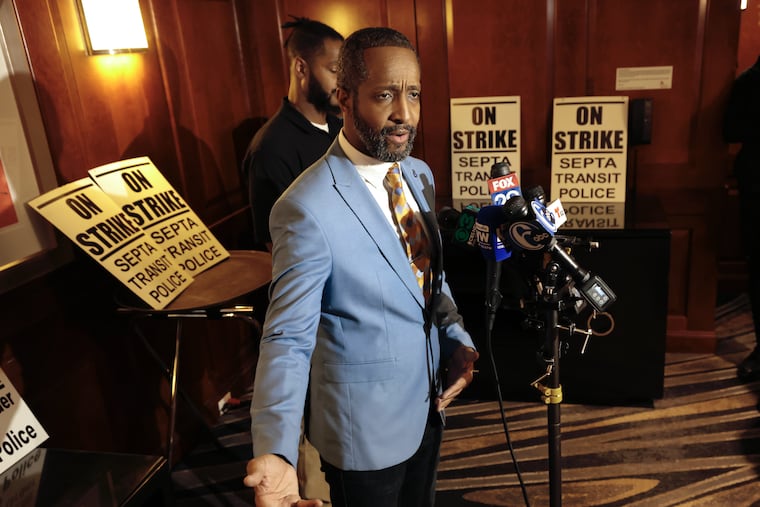SEPTA transit police are on strike
The union rejected the offer from the final round of negotiations. Service will not be disrupted, said the agency.

Members of the transit police union walked off the job on Wednesday evening after a final round of contract talks with SEPTA failed to produce an agreement.
Leaders of the Fraternal Order of Transit Police Lodge 109 said they put the authority’s latest offer before the members without recommending support. The union represents about 170 officers who protect SEPTA stations and its buses, trolleys, and subways. They have been working without a contract since March 31.
Patrol officers went on strike just before 7 p.m., following 12 hours of voting at the Philadelphia Marriott Downtown. Two thirds of the 124 officers who voted on Wednesday rejected SEPTA’s latest offer, according to union vice president Troy Parham. Union members are to begin picketing SEPTA headquarters on Market Street at 9 a.m. Thursday.
Service on SEPTA will not be disrupted by the strike, the agency said. The transit system would be patrolled by 60 nonunionized transit police supervisors with help from the Pennsylvania State Police and Philadelphia Police Department, as well as officers from other agencies in the five counties of Southeastern Pennsylvania.
Riders can continue to contact police at 215-580-8111 or, in the event of an emergency, call 911, the agency said on Wednesday night in a statement.
» READ MORE: What you need to know for your commute while SEPTA police are on strike
“Instead of walking the beat and patrolling public transit, we will be walking the picket line,” the union’s president, Omari Bervine, who is a SEPTA patrol officer, said in a statement. “SEPTA has devalued their patrol officers. ... We deserve comparable wages and terms to what bus drivers and other transit workers received.”
When bargaining stalled Nov. 20, leaders of the transit police union pulled back from a threatened strike until Wednesday, allowing for further contract talks. They also commissioned an economic analysis of the agency’s last November offer, which union leaders had deemed unacceptable.
Jeremy Crimmel, the economist for the union, said it would cost SEPTA just $650,000 over three years to give the transit officers the same wage increases given last month to SEPTA’s largest bargaining unit, Transport Workers Union Local 234, which represents bus, trolley, and transit train operators.
Bervine said that the cost difference between what the union wanted and what SEPTA proposed was negligible, 0.04% of the agency’s yearly operating budget. “They’d need a magnifying glass to see it,” he said.
SEPTA’s offer
The transit police union said it was promised parity with the one-year TWU deal, which raised pay 13%, counting increases in its former two-year deal, and including a new $3,000 signing bonus.
“I wish I could say I was surprised but unfortunately I’m not,” Bervine said Wednesday night. “People are angry. They feel they’re being shortchanged … screwed over.”
Over the last three weeks, the two sides met six to eight times, including into the evening Tuesday, discussing a new offer from SEPTA, but no agreement was reached. Members began in-person voting at 6 a.m. Wednesday.
“SEPTA has made a revised offer that we think is fair to our hardworking police,” spokesperson Andrew Busch said. “We’re ready to return to the negotiating table at any time.”
That offer would give union members raises of 3% in March 2024, 3% in March 2025, 4% in July 2025, and 3% in March 2026, Busch said. Officers also would get a $3,000 signing bonus.
The agency also tweaked the transit police longevity pay raises so that officers get them faster instead of waiting until Jan. 1 following their hiring anniversary.
But the police union said the problem is it would take members 43 months to get a TWU-sized raise instead of 36 months, by its calculations, because SEPTA is not accounting for six months in the previous contract without a pay increase.
“They told us we’d get a three-year deal with 13% wage increases,” Bervine said. “We’re not going to argue about what a month is.”
Parham said that “the term of the contract is what we are stuck on now,” during a Wednesday night news conference. “We still haven’t seen a three-year contract.” At the same time, he said that “We’ll start talking [again] as soon as they’re ready.
The bigger picture
In 2019, transit officers walked out for six days, in part over whether members could review body-camera footage before filing incident reports. They struck in 2012 over a 15-cent difference between the FOTP’s demand and SEPTA’s offer for an increase in the hourly rate that members received for annual recertification as police officers.
This year, the Fraternal Order of Transit Police said that its ranks are 25% smaller than budgeted, despite an influx of recruits, as officers continue to leave for jobs at Amtrak, Temple University, or other law enforcement agencies in the region.
Transit funding is often uncertain, and SEPTA and its peers have said before that finances are limited. But they face unusual financial headwinds at the moment. SEPTA anticipates an annual $240 million deficit in its operating budget starting in 2024, as it spends the last of its federal pandemic aid.
“We urge FOTP to return to the bargaining table so we can agree on a contract,” Busch said.